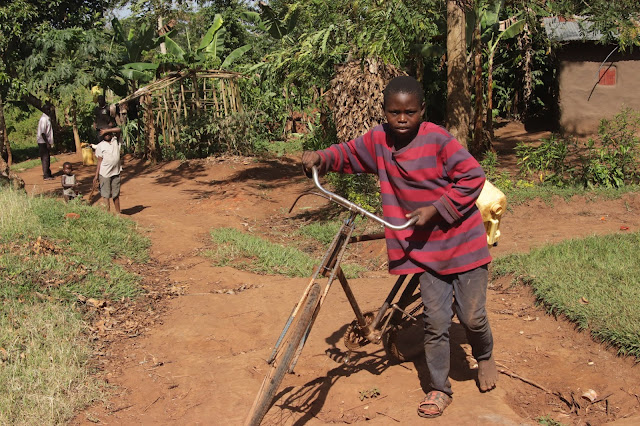Day 3 - Kivu region, Rwanda style
We leave Kigali today. But not without a struggle. It is busy in the city and traffic jams are also part of life here. A flood in the city causes traffic to stop completely. But a traffic jam is never boring, because it is the ideal time to watch people and observe life in Kigali. In the main streets, the shops sell everything you can think of. It is impossible to imagine the streets without hundreds of motorcycles, which mainly serve as taxis. Convenient and fast in a busy city. Mini buses from the local transport company are packed full. As soon as we leave the city, busy city life gives way to quiet rural life. Rwanda is very hilly, remember those thousand hills? And also very green. A beautiful landscape to travel through. Along the side of the road, children are on their way to school in their colorful and flawless uniform with crisp white socks underneath. Some have to walk several miles and after a day at school, they also have to return home. What is also very striking is how clean the streets and the countryside are. No illegal waste along the side of the road, no cans, tetra packs or plastic bags. This was already striking after landing in Kigali. It does not look like elsewhere in Africa or even with us. This is mainly because Rwanda banned the use of plastic bags years ago. It is also strictly forbidden for tourists to bring plastic bags into the country on penalty of heavy fines. Both in the city and in the countryside you will find houses ranging from wooden barracks, semi-finished stone houses and locally a beautiful large villa with a perfectly finished garden. However, one thing is missing everywhere: there is no running water in the houses. And so countless women and children are also on their way to the water source with water jars on their heads. Men, on the other hand, also carry a heavy load, but usually on their bicycles. The route is already hilly and on top of that there are gigantic bunches of bananas or long branches of wood to let the fire burn at home. Women are also doing their bit. They carry wood, fruit and other groceries in the only way they know: on their heads. And they have learned that from an early age. First of course with small, light objects to train the muscles in the head and neck and to learn to maintain balance. Those objects get heavier so that carrying groceries on their heads becomes automatic. Along the side of the road we notice market stalls with fruit and vegetables right off the field. It is mainly the women who work the field and who are also responsible for the sale. The landscape is also the ideal playground for goats and sheep. Cows also love the green grass along the side of the road. Life as it is in the African countryside.
Today's destination is Lake Kivu. The gigantic lake has a
surface of 2,370 km² and is one of the so-called Great Lakes of Africa. The
lake dominates the border between Rwanda and Congo. It is bordered with green
terraces where trees, plants and crops thrive. It is a freshwater lake with
only a limited number of fish species. This is due to the presence of methane
gas in the water, caused by the volcanic underground. A particularly nice side
effect is that there are neither crocodiles nor hippos in the water. That means
you can swim to your heart's content in the lake.
The area around Lake Kivu in
both Rwanda and Congo is called the Kivu region. It is a fertile area thanks to
the rich volcanic soil and its location at about 1,500 m height. All kinds of crops
are grown here, the most important of which are Kivu coffee, Kivu tea and
bananas. The views of the lake are extraordinary. On the horizon our former
colony of Congo is glimping. You unwillingly think of the unstable situation
across the lake. When I hear the name Kivu, I first think of the unprecedented
humanitarian crisis in eastern Congo as a result of years of war and the
never-seen refugee flow that started. Eastern Congo is and always will be the problem
child of East Africa. On the Rwanda side of the lake, it is a lot calmer and more idyllic.
The Congo
Nile Trail is a cycling and /or walking path of about 227 km through the Kivu
region. The trail takes you past banana trees, coffee plantations and elegant
tea plantations consisting of fans of emerald green tea plants. Along the water
you will find small fishing villages from where the fishermen leave every day
with their wooden boats for the catch of the day. Along the way you have
beautiful views of the lake with small islands that look like stars on the
glistening water. The route consists of a series of existing roads of both dirt
and asphalt. Ideal to relax and enjoy the serenity and beauty of Lake Kivu,
Rwanda style.






Comments
Post a Comment